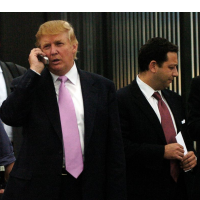Judge Weighs Releasing Sealed Court Records on Convicted Felon Hired as Trump Senior Advisor
 Donald Trump and Felix Sater (photo: Cyrus McCrimmon, Denver Post/Getty Images)
Donald Trump and Felix Sater (photo: Cyrus McCrimmon, Denver Post/Getty Images)
By Jeff Horwitz, Associated Press
WASHINGTON (AP) — A federal judge has asked the Obama administration to shield from public disclosure court records related to the once-secret criminal history of a former Donald Trump business partner.
In an unusual order prompted by an unsealing request from The Associated Press, U.S. District Judge Brian M. Cogan said that unless the Justice Department acts before April 18, he will decide whether to make the court files public under the assumption that federal prosecutors don't care.
The case involves Felix Sater, a Trump business associate who pleaded guilty in a major Mafia-linked stock fraud scheme in the late 1990s and cooperated with the government. The AP reported in December that, even after learning about Sater's background, Trump tapped Sater for a business development role in 2010 that included the title of senior adviser to Trump, and had an office in the Trump Organization's headquarters.
Sater's criminal past initially drew attention because of his ties to Trump, now the front-runner for the Republican presidential nomination. But legal disputes over information related to Sater's efforts to cooperate with the government — which was ongoing during the period he worked with Trump — also raises questions about court secrecy.
"It seems to me that the government has a unique interest in keeping documents that relate to cooperation agreements under seal," Cogan wrote in his order. "The government should speak and assert its position as to whether the public's right to access each document in the record is outweighed by a compelling need for secrecy."
Lawyers for the AP had asked the judge to justify sealing a five-year criminal contempt proceeding in U.S. District Court for the Eastern District of New York.
Not only did Cogan seal all documents in the contempt case, he also initially censored the AP's request that he unseal his justification for being withheld from public view. When The New York Times asked the judge to make public the AP's request to release the documents, that request was kept secret, too. Late last week, the judge also made requests by the AP and the newspaper publicly accessible — but ordered that the parties to the case file any responses to them under seal.
The defendants in the contempt case, Frederick Oberlander and Richard Lerner, are attorneys the government said revealed once-secret court records about Sater's crimes and cooperation. Sater's lawyers — who once included Leslie Caldwell, now the head of the Justice Department's criminal division — have said that Sater's cooperation was vital to national security and disclosures about his past put him in danger.
Oberlander and Lerner said they never revealed sealed records. Some of what they had been ordered not to disclose is already publicly available in the Congressional Record, they said.
Also at issue in the case are statements that U.S. Attorney General Loretta Lynch — formerly the top prosecutor in Cogan's district — made about Sater's case before the Senate confirmed her last year. Oberlander and Lerner said the government improperly permitted Sater to use his status as a secret cooperator to commit new crimes and avoid paying restitution to past victims, who are owed millions of dollars.
In February 2015, Lynch told Republican Sen. Orrin Hatch of Utah that information about Sater's restitution "remains under seal," and that the Justice Department would never waive victims' right to restitution as part of a cooperation agreement. Court records publicly available at the time showed Sater was not ordered to pay back the victims. One of Sater's attorneys said at the time that the lack of restitution, and the $25,000 fine, reflected the difficulty of identifying specific victims and the government's gratitude to Sater.
A Justice Department spokeswoman, Melanie Newman, told the AP that Lynch's comments were accurate because some documents related to restitution in Sater's case remain private.
Oberlander told the AP that the original cooperation agreement Sater signed in 1998, which has been publicly available since 2013, said Sater acknowledged that the penalty for his crime included roughly $60 million in restitution payments to victims.
The New York judge has twice asked the Justice Department to pursue contempt charges against the two lawyers who revealed Sater's cooperation. In both cases, local federal prosecutors recused themselves over unspecified conflicts of interest after consulting with Justice Department officials in Washington. They referred the case to federal prosecutors in Albany, New York, who likewise did not act.
Sater's attorney, Robert Wolf, said the judge was right for urging the government to take action against Oberlander and Lerner. He said his client provided information that "potentially saved tens of thousands, if not millions, of our citizens' lives."
To Learn More:
Exercising Right to Protest Is a Dangerous Undertaking at Trump Rallies (by Ashley Parker, New York Times)
Twitter Still Trump’s Favorite Tool for Fear Mongering and Character Assassination (by Alexander Burns and Maggie Haberman, New York Times)
Conservatives Decide Trump Qualifies as a Fascist (by Noel Brinkerhoff, AllGov)
- Top Stories
- Unusual News
- Where is the Money Going?
- Controversies
- U.S. and the World
- Appointments and Resignations
- Latest News
- Trump Announces He Will Switch Support from Russia to Ukraine
- Americans are Unhappy with the Direction of the Country…What’s New?
- Can Biden Murder Trump and Get Away With it?
- Electoral Advice for the Democratic and Republican Parties
- U.S. Ambassador to Greece: Who is George Tsunis?






Comments